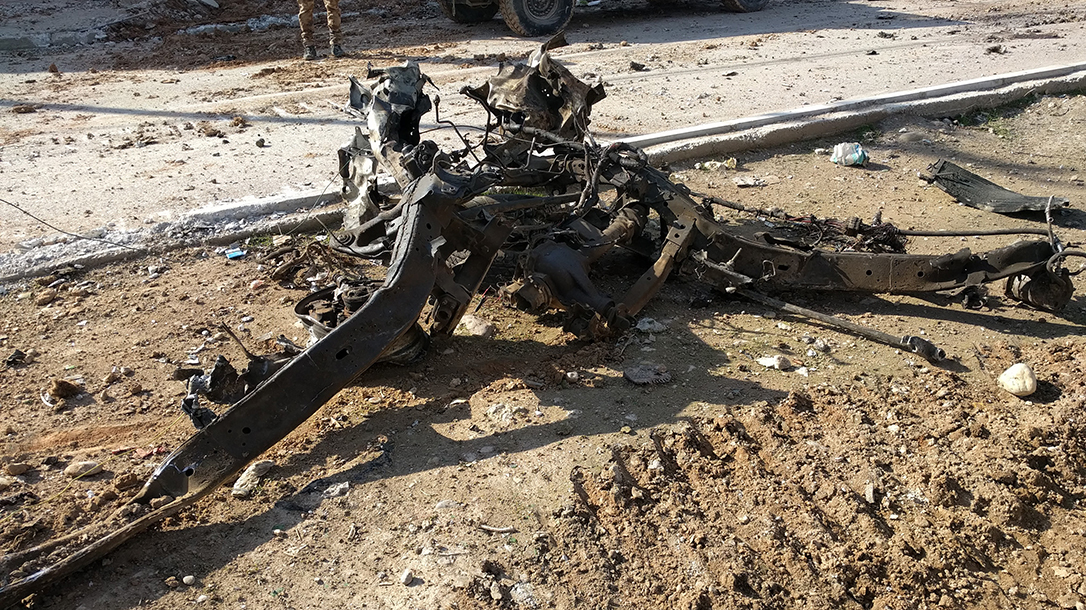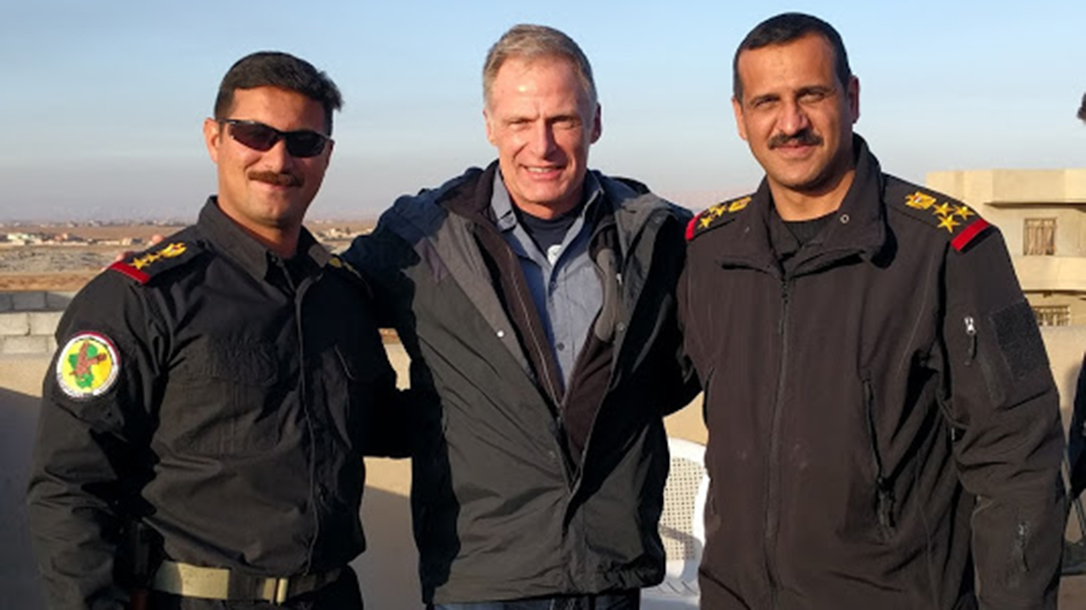The suicide car bomb was covered in steel plating and painted white to blend in with other traffic. It appeared from a side street 100 meters ahead and raced straight for the armored bulldozer clearing a path toward ISIS positions. I had three simultaneous thoughts as a war reporter:
- Warn the Iraqi Counter Terrorism Service (ICTS) troops to take cover.
- My helmet cam wasn’t turned on, and I’d just missed videoing an ISIS suicide vehicle-borne improvised explosive device (SVBIED) attack.
- Duck.
I yelled “Cee-yara!” (Iraqi slang for SVBIED) to my brothers and ducked behind a Humvee. I kept my mouth open for the overpressure of the explosion, which was big. I rose up with my handheld camera recording and watched the car’s steering column spinning through the air toward our position. It landed just behind us.
An ISIS drone appeared overhead recording the event for their propaganda. ICTS troops began firing on it as the wounded moved back to my position near their command element.
It was one of many SVBIEDs Iraqi forces fighting ISIS inside Mosul faced every day — and I was the only American at the time, embedded with their most elite units, seeing the urban combat up close. Really close.
Not My First Rodeo
My previous trip to Iraq was at taxpayer expense. This time I was in Iraq as a civilian, traveling alone and paying my own way. I was there to keep a promise I had made to return and reunite with the same officers I had advised during the troop surge of 2007-2008.

I was also there to document the fight against ISIS for my master’s thesis in journalism, and I knew a trip to a war zone between semesters would make for a unique capstone project. The university’s journalism department fully supported my idea, and even loaned me their cameras.
Thanks to international news and social media, I learned the two Iraqi officers I advised during the surge were now directing their units’ fight inside Mosul. Brig. Gen. Abbas al-Jubouri was leading the Emergency Response Division and attacking from the southeast as Brig. Gen. Haider al-Obeidi of the Iraqi Counter Terrorism Service attacked from due east.
I reestablished contact with both men and asked if I could join them. They quickly replied and said I would be welcomed and could ride into battle at their side for as long as I was in Iraq. It sounded like a perfect war vacation.
Planning the Mission as a War Reporter
I went into mission planning mode, speaking with journalists who had traveled to Iraq in recent months to learn what was needed for an unsupported, self-funded, solo trip to the combat zone. They gave me great advice on checkpoints en route to Mosul, press credentials and where to stay.
I booked my travel, selecting an itinerary that avoided Middle Eastern transit countries. Something as simple as a GPS in your checked bag could have you pulled into an interrogation for hours, and I’d be traveling with Iraqi uniforms, body armor, helmet, cell phone, sat phone, laptop, two hard drives, three cameras, medical supplies and yes — a GPS. I made hotel reservations using a service I had seen on television. I laughed at the ease with which I was returning to Iraq.
A refresher in combat trauma care, Iraqi-dialect language immersion, protecting my electronic footprint, updating immunizations and putting together my cameras, kit, gifts and barter items rounded out my travel preparations — all done while taking a full load of classes and working an internship at a TV news station in Denver, Colorado.
So It Begins
Just before Christmas 2016, I departed Denver for Erbil, Iraq, flying Lufthansa and Austrian Airlines. I practiced my German on the planes during the long layovers in Frankfurt and Vienna. I also used the time to study my camera manuals as well as the Iraqi vocabulary specific to conversations I expected to have in Erbil and Mosul.

Upon arrival in Erbil, I had my new, clean passport stamped with a 30-day visitor visa and gathered my three bags from the luggage carousel. Then I went to the Korek Telecom counter to buy a local sim card for my new phone. Once it was activated, I immediately texted my Iraqi friends to let them know I had arrived.
The Airport Game
The last thing to do in the airport was to clear customs, and I knew what to expect. It went like this, all in Arabic:
Customs: “Sir, you have a helmet and vest in your bag. Are you a soldier?”
Me: “No, I was a soldier. I’m retired from the Army. I’m a correspondent, a war reporter.”
Customs: “Do you have a press badge?”
Me: “Yes, I do. Here it is.”
I handed the young Kurdish customs officer the badge I had made a few days before. He pointed to the flag of Kurdistan on the front and smiled, handing it back.
“Sorry to trouble you, sir. Welcome to Kurdistan,” he said.
“No trouble at all. Are the taxis this way?” I asked.
Off I went, smiling at how well this whole thing was going and how much fun I was having already as a war reporter.
Adventure Awaits
The taxi ride to the hotel was quick, as was check-in. They took my $32 for the night, photocopied my passport so the security services would know who I was, and gave me my room key. Once inside, I checked for egress routes and unwanted electronics, and I hit the Wi-Fi to let some folks back home know I had completed infil.
The next seven days were all the same: Wake up. Put on tracksuit. Go downstairs to eat breakfast. Greet other guests. Call and text every Iraqi I could for permission to get to Mosul through the multiple checkpoints (some controlled by the Kurds, others by the Iraqi government). After phone calls and texts, study my vocabulary and drink coffee.
On the eighth day in Erbil, I was finally picked up by a member of the ICTS at the hotel. Sgt. Maj. Abdulwahab was in the black uniform and maroon beret of the Counter Terrorism Service, with a Glock 19 on his belt and M4 in the cab of his pickup. I asked if I should change into my black uniform. He said it would be easier to clear the Kurdish checkpoints if I stayed in civilian clothing.
Having Great Friends
He threw my bags in his truck while I checked out of the hotel, and then we were off to his unit’s command post in Mosul. Along the way, we stopped at checkpoints where some of the guards knew I was a war reporter and called me by name.
“Mister Mitch, you are General Fadhil’s friend. He told us you were coming through. Welcome, welcome, sir!” they said.
General Fadhil was one of the contacts I had reached out to for permission to get all the way to Mosul. My driver, Abdulwahab, was the sergeant major of Fadhil’s personal security detail. I was rolling in what Arabs call “wasta” — power and influence derived from whom you know and who knows you.
I could not help thinking, “Man, this would already make for a great movie.”
As we continued towards Mosul, I reflected on the military training, deployments and life experiences that combined to allow me to do what I was doing. I mused that reveling in ambiguity, wading into uncertainty and confidently believing that I would prevail is the only way to go through life.
The Plot Thickens
We arrived at a two-story house on the outskirts of East Mosul that served as the ICTS forward command post. Upstairs, I reunited with Haider al-Obeidi, whom I had not seen since May of 2008, when we were both majors. He was now a brigadier general and teased that I had only made lieutenant colonel before retiring. I joked that he had made his rank thanks to great advising from me. He introduced me to his fellow soldiers, and he took great pride in showing off his former advisor who had traveled all the way to Mosul to visit him and their unit.
With Haider was Colonel Arkan, already a media favorite for his perfect vernacular English and movie-star looks. Arkan was a graduate of the U.S. Army Ranger School and was Iraq’s premier joint terminal attack controller, who literally called the shots for all ICTS airstrikes against ISIS targets. I told Arkan I’d read about him in the U.S. media, and I passed greetings to him from a war reporter I’d met who knew him.
Tea was brought up from the downstairs kitchen and passed around, but we didn’t remain at the command post long. The sun was beginning to set, and it was time to move to the safe house.
“Mitch, yalla ruuh” (let’s go), Haider said.
The Time is Now
I confirmed my gear was in the back of his Humvee and then took the open seat behind him. Our three-vehicle convoy slowly rolled through the darkening, vacant streets only recently liberated from ISIS occupation.

The sound of the vehicle was comforting and familiar — the ratcheting of the turret as the gunner rotated it, the rumble of the diesel engine and the tinny voices on the radio as the convoy communicated internally that we were all old friends. I thought how good it was to be back to a war, but this was better than any deployment. Here in Mosul, I was only responsible for myself.
Safe at Last
At the safe house, Haider and Arkan put in me their room and gave me a cot in the corner. Almost immediately, the cook brought in a platter of food and we sat on the floor and ate with our hands. Other ICTS troops dropped in to see what Haider’s American brother looked like. The word went around that I had arrived, and even spoke some Arabic. They all wanted to talk to me and hear me say something. I felt a bit like Charlton Heston in “Planet of the Apes.”
After dinner, Haider said we would be visiting the forward line of troops tomorrow, so I prepped my gear, checked out the latrine and grabbed some bottled water. After lights out, Haider was asleep in 30 seconds, as was Arkan a minute later. I dozed off to the sound of artillery and airstrikes pounding ISIS targets inside Mosul. That night, this war reporter slept really well.
Interested in becoming a war reporter? Check out our podcast Skillset Live! Get in on the conversation on our social media pages or pick up a back issue of our magazine at OutdoorGroupStore.com!






















